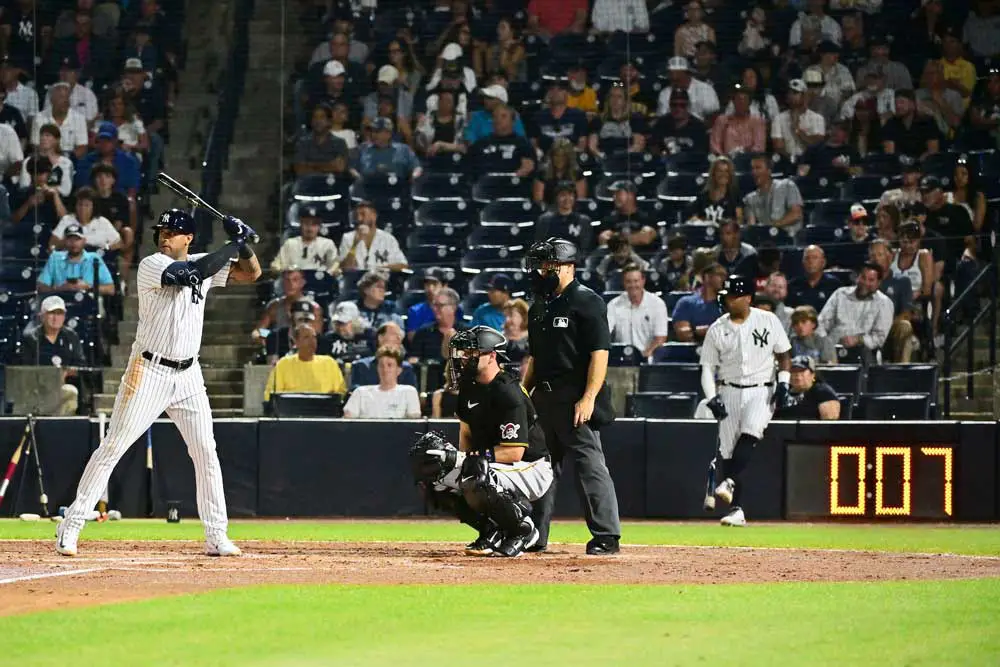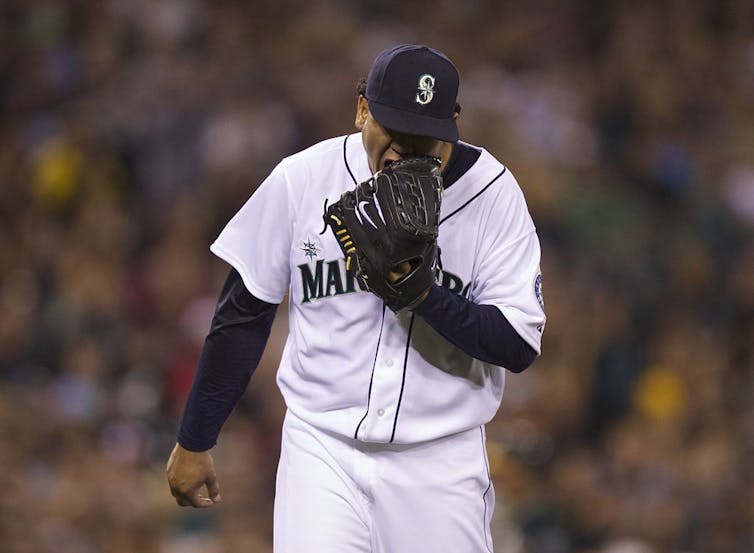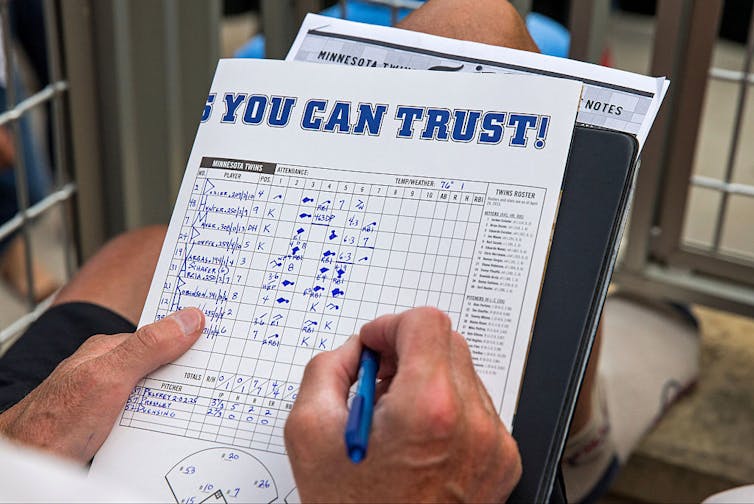
By Alva Noë
Baseball moves very fast. That’s how it seems to me, anyway.
Just try coaching a Little League game; decisions pile up like branches on a tree, as tactical and strategic considerations multiply.
And as a player, when it’s time to act, you need to do so before you even get to the “t” in “think,” as a coach I know used to say.
That’s why it’s hard for me to shake the worry that the executives who restlessly tinker with the rules in an effort to speed up the game are doing so less as its reliable custodians and more as marketers.
Why else would they have adopted the new pitch clock rule?
Beginning this season in Major League Baseball, pitchers will have 15 seconds to throw when the bases are empty and 20 seconds when there’s a runner on base. Hitters need to be in the box, looking at the pitcher, with 8 seconds left on the clock. Violators will be punished by automatic balls or strikes. There are new time limits on managers’ deliberations on whether to challenge calls on the field, too.
But to me, the idea that you need to get things to move faster because it might seem to you – or to potential customers – as if nothing is going on is either a brazen sellout or a remarkable piece of ignorance.
During these purported empty spaces of inaction, the game’s drama is actually unfurling right there in front of you. As I explain in my book “Infinite Baseball,” you just have to know what to look for.
Seeing the game better
Every plate appearance – that willful and wily exchange between batter and pitcher – unfolds at the center of attention of every player and spectator.
Hitters develop ways of excelling – or, I should say, coping – and to some extent their strategy consists in scratching out seconds and milliseconds to collect their thoughts, to read the signals, to settle themselves in the box by breathing in, breathing out.
Pitchers, meanwhile, work to control the rhythm and keep the hitters off guard by concealing what’s coming next.
The scrutiny can be vicious. Twelve-year-old baseball players routinely burst into tears when they have struck out or grounded out yet again.

Stephen Brashear/Getty Images
Professional baseball players, no less than their younger counterparts, need tactical guidance and emotional support. The manager is cool in the dugout, surrounded by consiglieri, and in constant contact with coaches on the first and third baselines, who, for their part, are talking to the players.
It’s not rocket science, to be sure; but there is a lot to think about – whether to take a pitch, or fake bunt, or run on contact, or hold, or steal, or sacrifice, and on and on, with answers depending on the situation that itself varies pitch to pitch. Players need all the help they can get.
Clock time is not the only time. Pitches and plate appearances and outs and innings are another way to mark time, the way time in tennis is counted in service games, sets and match points.
In my view, baseball’s problem is not that it is too slow. It’s that it’s too fast. There’s a lot of action; it’s just that novice fans may not have the eyes to see it.
That’s what baseball should be helping viewers do: Slow the game down so they can see it better; or rather, teach them to see it better.
Baseball is an opportunity to learn to see, to notice the detail, to pay attention and uncover the decisions that inform everything that happens on the field. Fielders shift their positions, batters adjust their stances, catchers vary the target they provide, runners shorten or extend their leads.
It all carries information.
The game only shows up if you do
But baseball executives who sell the game, and are willing to sell it out, do so by making the game itself expendable. Your typical MLB game is drowned out in distracting bright lights, ear-splitting music, sideline games and giveaways. Roving cameras encourage fans to dance for the public or make out with the person next to them.
Fun is good, and I enjoy the carnival atmosphere, too. (Although if it’s a circus you want, you might prefer the Savannah Bananas, a wildly popular minor league team whose players wear kilts and who have adopted a rule calling a home run an out if a fan catches the ball.) And I don’t begrudge baseball’s entrepreneurs their payday. But no wonder the game seems boring beside all that. The game shows up only if you do.
The problem is not change. Imagine if baseball had never evolved from its past incarnations – the dead ball era when home runs were a rarity, segregated leagues and no free agency. And baseball responded to the remarkable 1968 season, known as “the year of the pitcher,” by actually lowering the pitcher’s mound to shift advantage back to batters.
Baseball, like the law – and like society itself – evolves.
Actually, there is another respect in which baseball is like the law. In baseball, the events on the field of play matter less than the assignments of responsibility and the judgments of praise – and blameworthiness.
Real baseball is in the scorebook, for it is there that hits are sorted from physically indiscernible patterns of action that count as fielder’s choices, or errors, or sacrifices. It is there that mere runs separate themselves from earned runs, and that stolen bases assert themselves as achievements that don’t come down to mere defensive indifference.

Brace Hemmelgarn/Minnesota Twins via Getty Images
This is why keeping score in baseball is never just marking down what happens, like hatch marks on a prison wall marking the passage of time; it is always, rather, a thoughtful reflection on the meaning of events, and so is more like a daily journal.
And it is baseball’s problems – pertaining not only to the question of who’s winning, but rather who deserves credit or blame for this rapid-fire thing that just happened on the field – that define the game and preoccupy players, coaches and fans.
It is this space, one that is not limited to the physical field of play, that finally defines the national pastime and joins players and fans alike in its preservation and celebration.
I certainly appreciate that shorter games, like shorter books, have a certain attraction. They are less demanding and more user-friendly. And there is no doubt that games in MLB have gotten much longer than they used to be.
But baseball’s executives should avoid ruining the game in order to save it.
![]()
Professor of Philosophy at the University of California, Berkeley, the author, most recently, of “Learning To Look: Dispatches from the Art World” (Oxford, 2022), and not least, a graduate of the United Nations International School in New York.





























Robert OConnell says
I had a conversation with another fan at a spring training game, and he said in way that the pitch clock negates all the baseball sabermetrics! I happen to agree with that analysis!! Play Ball!
Geezer says
If you’re an older person who enjoyed baseball in the seventies thru the late nineties
you may feel like I do.
MLB Baseball is dead to me.
I remember Reggie Jackson signing for 3 million in 1977 and thought he was worth every penny.
The guy played with intensity, he would hit in the clutch—he was Mr. October.
Why is Aaron Judge earning 100 times what Jackson did?
It isn’t inflation. The price of bread didn’t go up to 100.00 per loaf.
It’s just greed and bloat…
When was the last time you saw a pitcher throw a complete game?
Today’s ballplayers are brittle, injury-prone athletes earning hundreds of millions of dollars per contract.
Then there are analytics and a new pitch clock, not to mention that it’s expensive to watch your favorite
team play on streaming services or cable.
MLB Baseball is dead to me (said that before) but I have great memories of the glory days of baseball.
I’d rather watch a whole season of video-taped baseball games from the past.
You know, when baseball was…baseball.
Burton W Head says
I am an old man, a lifelong sports fan; especially baseball and I strongly disagree with Professor Alva Noe on the rule changes presently being made to baseball.
Having watched and attended professional baseball games since the early 1960’s, I have watched as the games grew slower and slower. Batters hitting 200 backing out of the box with each pitch and unstrapping and re-strapping each golf glove, removing and replacing his batting helmet, adjusting his crotch cup then stepping back into the box with one foot while holding up his back hand to the umpire signaling he is not ready before finally stepping into the box with his front foot. All the while the pitcher is standing on the mound. Now the pitcher stares at the catcher for the sign and if he stares more than a few seconds the batter backs out of the box again and proceeds to redo the above scenario; ridiculous.
The game that I love has become unwatchable.
The amount of time the ball is in play in baseball is miniscule (less than 1%) and of major sports, only golf is worse. The attendance is in steady decline as in the tv viewership. Major changes are/were needed. Only time will tell if the new changes are enough.
Finally, think about basketball before 1974. The Dean Smith four corner keep away, the 11 to 6 Tennessee win over Temple. Basketball was going nowhere until the shot clock and the 3 point shot completely reinvigorated the game and look at it today. Todays sports fans, especially the young, want action and scoring (lack of scoring is the #1 reason for soccer not catching on in the US). At least in soccer there is ball in play action even when not scoring; not so much in baseball.
I think the new rules will help; I just hope it is enough.
Capt Burt